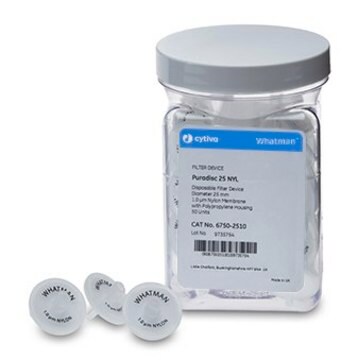WHAUS203NPUNYL
Filtros sin jeringas Whatman® Mini-UniPrep® con tapones hendidos
Nylon, 0.45 μm, 100/pk
About This Item
Productos recomendados
material
Nylon membrane
polypropylene housing (compatible with all major autosamplers)
polypropylene housing
sterility
non-sterile
usage
aqueous/organic samples in 3 to 10 pH range
feature
cap (Split septa)
graduations: no
approximately 18 lb / 8.2 kg
packaging
pkg of 100 ea
manufacturer/tradename
Whatman Article No. 28421713 (US reference)
Whatman US203NPUNYL
filter capacity
400 μL
vial size
12 mm × 32 mm
pore size
0.45 μm
suitability
suitable for (standard robotics on HPLC instruments with sensitive needles, allowing for higher throughput; high throughput applications)
¿Está buscando productos similares? Visita Guía de comparación de productos
General description
Transform your HPLC and UHPLC sample preparation with our Mini-UniPrep® syringeless filters. These filters combine four steps into one to offer a fast, efficient, and environmentally friendly solution to sample filtration prior to chromatography.
Chromatography sample preparation steps traditionally involve multiple consumables like syringe filters, vials, and septa, which increases costs and time required for sample filtration. Mini-UniPrep® syringeless filters eliminate the need for these separate disposable components and prepare samples in one-third the time required by other methods used for high performance liquid chromatography.
By excluding large particles from a chromatography sample, the time required to process the mobile phase is shortened and HPLC column life is extended by reducing contamination that causes clogging and back pressure build up.
Mini-UniPrep® syringeless filters can be used either manually or with a multicompressor. The multicompressor allows for processing of multiple filtration samples, further reducing sample preparation time for chromatographic analysis.
Using the Mini-UniPrep® syringeless filter is easy. If you are not using a multicompressor, simply place your sample in the Mini-UniPrep® device, insert the plunger, and compress. Your sample is filtered rapidly and easily. The unique design allows the liquid sample to be forced into the reservoir of the plunger. Any excess air escapes though the vent hole until the seal is engaged. The Mini-UniPrep® syringeless filter can then be used in an autosampler.
Application
- Routine HPLC/UHPLC analysis
- Composite assays
- Content uniformity
- Protein precipitation
- Solubility testing
- Dissolution testing
- Sample filtration
Features and Benefits
- All-in-One filtration device for quick and cost-effective chromatography sample processing
- Eliminates the need for separate syringes, syringe membrane filters, vials, and septa
- Designed for use with an UHPLC or HPLC autosampler for high-throughput analysis
- 0.2 µm and 0.45 µm filter pore sizes available to meet filtration sample requirements
- Compatible with most major autosamplers
- Housing options: amber to prevent photodegradation of light-sensitive samples, or translucent for easy visual inspection made from polypropylene (PP) material
- Recyclable after use.
Legal Information
Elija entre una de las versiones más recientes:
Certificados de análisis (COA)
Lo sentimos, en este momento no disponemos de COAs para este producto en línea.
Si necesita más asistencia, póngase en contacto con Atención al cliente
¿Ya tiene este producto?
Encuentre la documentación para los productos que ha comprado recientemente en la Biblioteca de documentos.
Nuestro equipo de científicos tiene experiencia en todas las áreas de investigación: Ciencias de la vida, Ciencia de los materiales, Síntesis química, Cromatografía, Analítica y muchas otras.
Póngase en contacto con el Servicio técnico